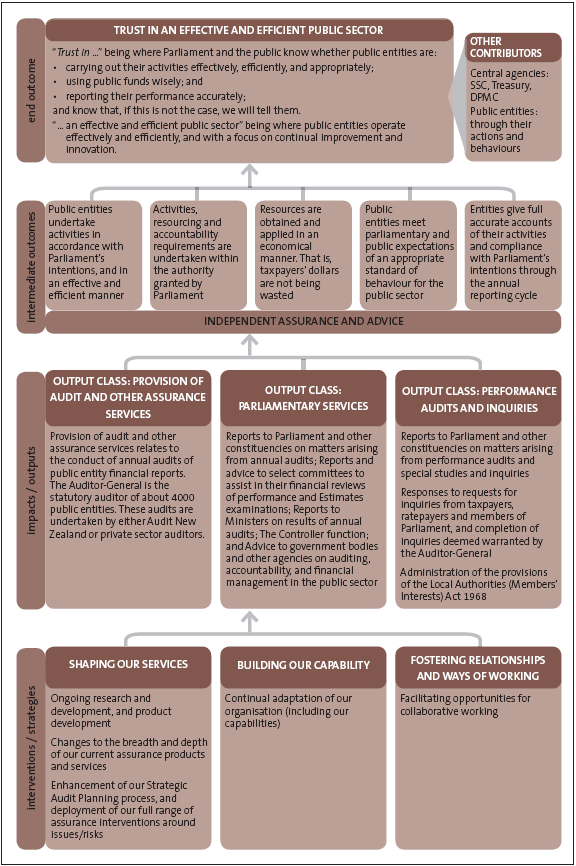Part 1: Background
Role and functions of the Auditor-General
The Controller and Auditor-General (the Auditor-General) is an Officer of Parliament.
The Public Audit Act 2001 sets out his mandate and responsibilities.
The Auditor-General is independent of executive government and Parliament in discharging the functions of the statutory office, but is answerable to Parliament for his stewardship of the public resources entrusted to him.
Parliament seeks independent assurance that public sector organisations are operating, and accounting for their performance, in accordance with Parliament’s intentions. There is also a need for independent assurance of local government because local authorities are accountable to the public for the activities they fund through locally raised revenue. As an Officer of Parliament, the Auditor-General provides this independent assurance to both Parliament and the public.
Our operating model
The Auditor-General’s staff are organised into two business units – the Office of the Auditor-General and Audit New Zealand.
The Office of the Auditor-General carries out strategic audit planning, sets policy and standards, appoints auditors and oversees their performance, carries out performance audits, provides reports and advice to Parliament, and carries out inquiries and other special studies.
Audit New Zealand carries out annual audits allocated by the Auditor-General. It also provides other assurance services to public entities, within the Auditor- General’s mandate and in accordance with the Auditor-General’s auditing standard on the independence of auditors.
The Auditor-General also engages audit partners from private sector accounting firms to carry out his statutory functions for some public entities. Figure 1 shows the Auditor-General’s operating model.
Figure 1
The Auditor-General’s operating model

For the majority of public entities, the Auditor-General allocates annual audits to auditors. He chooses from a pool of audit service providers that includes Audit New Zealand, the four major chartered accounting firms, and a range of smaller firms. Where the Auditor-General deems it appropriate, some public entities that have a strong commercial focus and schools are given the option of a contestable regime for appointing their auditor.
Our current staff and contracted resource base
We employ 288 staff in eight locations throughout New Zealand. We also engage about 60 audit service providers, in addition to Audit New Zealand, to carry out annual audits of public entities.
Working toward our desired outcome
Our desired overall outcome is trust in the effectiveness and efficiency of the public sector. A measure of this trust is that New Zealand’s Transparency International Corruption Perception Index ranking is maintained or improved.
In 2006, New Zealand’s score was 9.6 on a 10-point scale, meaning it ranked first equal on the index with Finland and Iceland. This is an improvement on the 2005/06 year, during which New Zealand was ranked second equal (with Finland and behind Iceland). In achieving the 2006 ranking, New Zealand’s score of 9.6 was the same as that of 2005. The lowest country’s score was 1.8.
We measure how, as a result of our work, we contribute to our desired outcome of “maintaining and enhancing trust in an effective and efficient public sector”. We do this by considering improvements over time in Parliament’s and the public’s perceptions of public sector performance and trustworthiness.
We set out the key performance measures and standards we use to measure the outcome and impact of our work for the output class areas they relate to in subsequent sections of this report. These output classes are:
- provision of audit and other assurance services;
- parliamentary services; and
- performance audits and inquiries.
Figure 2 shows the Auditor-General’s outcome framework.
Figure 2
The Auditor-General’s outcome framework
 page top
page top
